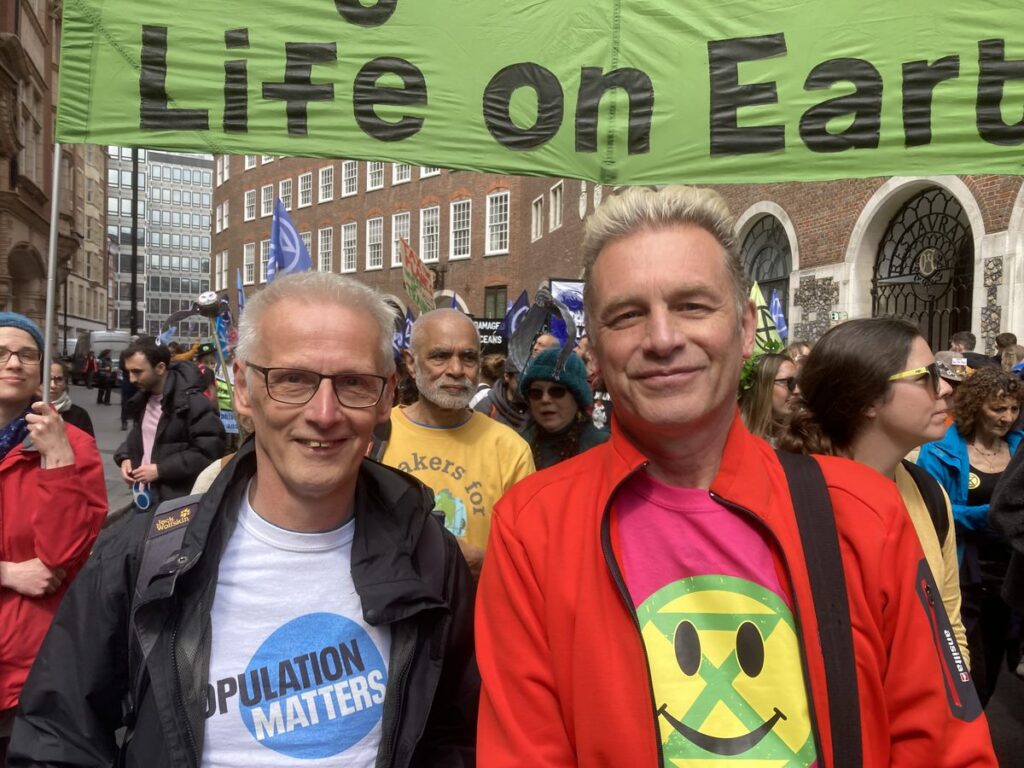
2023 in review: Population Matters in the media
It’s been another busy year at Population Matters, which is reflected in the amount of media coverage we received in the last 12 months. Here, we look at some of the articles, comment pieces and podcasts featuring Population Matters in 2023.

January blues
Population Matters (PM) kicked off 2023 with a decent amount of coverage in varied outlets. On 5 January, The Guardian published a letter from our ex-Executive Director, Robin Maynard, titled Population growth is a key driver of climate breakdown and biodiversity loss.
Over that same 50-year period, our human population has more than doubled – a key driver of both climate change and biodiversity loss conspicuously absent from the article. Not least the event of humanity topping 8 billion last year on 15 November.”
Robin Maynard in The Guardian
In 2022, China’s population declined for the first time in 60 years. BBC Futures ran a lengthy piece analysing the reasons for the drop in which Alistair Currie, our Head of Campaigns & Communications, was quoted giving some important context. The Turkish public broadcaster TRT World also ran a similar story which quoted PM.
This is happening in China now but it’s not happening in the rest of the world, it won’t happen on a global level for another 63 years.”
Alistair Currie on BBC Futures
We were also mentioned as a previous supporter of Komb Green Solutions (KGS) in The Star, Kenya. In 2021, we partnered with KGS, an environmental youth group located in Korogocho, one of Kenya’s large informal settlements. Empower to Plan support enabled KGS to continue river clean-ups during the initial wave of the COVID-19 pandemic, while properly protected with sanitary and PPE equipment.
Pronatalism in the news
We regularly report on those people who are pushing pronatalist agendas, and our Gilead Watch campaign exposes the actions and words of politicians and influencers all over the world. This has been reflected in several news stories and comment pieces including PM in 2023.

In February, indy100 ran a piece titled Everything Elon Musk has called the ‘biggest threat’ to the future of civilisation. It documents some of the “dramatic” assertions made by the tech billionaire, including his spurious claims of population collapse.
It might not be such a cause for concern though. Musk and others might claim it’s a real issue, but the latest developments have seen the claims about the so-called “population collapse” debunked – and labelled as coming “from outer space”. It comes after a UK-based non-profit [], Population Matters, looked into the claims made by Musk in a report.”
Harry Fletcher, indy100
On 5 October, PM had a letter published in The Guardian refuting UK MP Robert Jenrick’s position, after he suggested that British people should have more children to reduce the need for migrant care workers. In his letter, Alistair said:
Robert Jenrick’s contribution to baby-bust hysteria is straight out of the Viktor Orbán playbook. Ageing is a challenge we can meet with sensible, pragmatic measures, but combining demographic doom-mongering with anti-immigration sentiment turns a rational policy debate into a branch of the culture wars.”
In December, PM had a comment piece published on The Independent titled Why does Elon Musk want us all to have more kids? In it, we looked at some of the recent pronatalist chatter coming from politicians and the media in the UK, presenting it in an international context and looking at where that path could potentially lead if left unchallenged.
Another central tenet of the argument put forward by pronatalists often revolves around ageing populations and faltering economies; who is going to pay for us as we get older? But where do they imagine this pyramid scheme of human beings will end?”
Ben Stallworthy on The Independent
Phone-mo
Our We Don’t Buy It campaign exists because at the root of our environmental crisis is the simple reality that we are asking more of our planet than it can provide. Our Campaigns team worked hard around 24 November, Black Friday, to spread the message that our rampant consumption is having severe impacts on the planet.

- A study in 2019 found that up to 80% of Black Friday purchases are thrown away.
- These unwanted cheap goods, made from poor-quality unsustainable materials end up in landfills or are burned in incinerators.
- Nearly 40 per cent of UK adults intend to buy a new phone in Black Friday promotions, rising to 53 per cent amongst those aged 18 to 24.
- One in five young people feel under pressure from retailers, influencers and friends to have the latest model, whilst 40 per cent fear missing out on a bargain.
We also featured on several podcasts, including The Standard’s Tech & Science Daily, which you can listen back to here.
The best of the rest
Back in March, PM Patron Chris Packham wrote an important comment piece for the New Scientist, It’s now or never – we need to achieve a sustainable human population. In the article, he makes the point that getting to grips with population growth through a mixture of women’s rights, education and raising people out of poverty is the key to tackling our environmental crises.
Globally, equity must lie at the very core of our species’ future. We must urgently address gender inequality, improve education and tackle poverty. We are one species, with one big problem and one last chance to sort it out. And we can only do that together.”
Chris Packham in the New Scientist

Last summer, National World ran an article titled, Babies born in UK hits 20-year low – but government adviser says it is ‘good for our planet’ and ‘overconsumption’. In it, they said:
Slowing population growth is one way of reducing carbon emissions as a report by Population Matters found that the doubling of the world’s population to eight billion over the last 50 years has been a “critical driver” of climate change emissions.”
New Media & Campaigns Officer Madeleine wrote to The Guardian on the childfree issue in November, making the point that:
…public policies should be shaped to strengthen environmental protections and adapt to managing an ageing population, rather than boost birth rates. A universal human pursuit is to want to improve things for the next generation, even if in this case it means having a smaller one.”
Population Matters in 2024
This is just a selection of Population Matters’ coverage over the last year. If you want to see more stories from 2023, check out our media coverage page and to see our press releases, go here.
Thank you to all those who supported our work this year. We won’t rest on our laurels after such a busy 2023, we’ll be back early in the new year refreshed and ready to go again!
